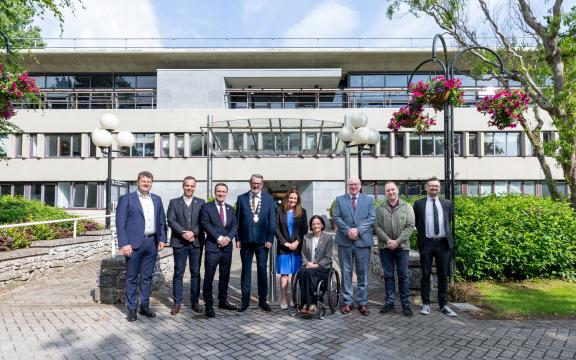
Growth opportunities for the Irish animation industry, international co-production, and increased presence for the Irish language on screen took a significant step forward with the Wellington-Galway Indigenous Animation Exchange 2025. The Exchange - a collaboration between the Galway and Wellington UNESCO Cities of Film - has opened doors between Irish speaking and Te Reo Māori animators, as well as key film industry stakeholders both here and in New Zealand, preparing the ground for future co-production possibilities and cultural exchanges between the two countries.
The Indigenous Animation Exchange is strongly focused on talent development for emerging animators. Its first recipients, Gaelgeoir Siobhán Ní Thuarisg, from Co. Galway, and Te Reo Māori speaker Seth Parata Stewart, from New Zealand’s North Island, were given residencies in each other’s country to experience the creation of animation content for a different first language.
Supported by Ardán, TG4, Údarás na Gaeltachta, Galway City Council, and Galway County Council in Ireland and Screen Wellington, Māoriland, and the New Zealand Film Commission in New Zealand, the Exchange is part of a wider development in the AV industry to empower indigenous language communities as they tell their own stories in their own tongue, and to provide support for those stories to reach the widest possible audience.
Growth of Indigenous Language Production
Minority languages, while often marginalised, are not peripheral, but are living languages, repositories of culture, and expressions of identity. They are also a growing field for the AV and creative industries, for employment, and for cross-cultural collaboration.
The recent success of TV series CRÁ, and films like Kneecap and the Oscar nominated An Cailín Ciúin, has seen Gaeilge take an acclaimed step onto the international stage. A notable trend is the rise of funding schemes supporting indigenous language film production, while streaming services now carry larger numbers of non-English language programming.The Exchange positions animation as a medium, making its own linguistic leap forward, with Irish and Te Reo Māori in the vanguard.
“The Exchange shows the future for minority languages is through international collaboration and solidarity,” said Siobhán Ní Thuarisg. “Such links bring these languages in from the margins and demonstrates how Irish and Te Reo Māori are viable media through which to pursue non-traditional careers.”
Co-production is Key to Sustainability
The Exchange saw Seth Parata Stewart, from Ōtaki in Māoriland - the New Zealand equivalent of the Gaeltacht - in Ireland in May, to attend Telegael, Studio Meala, and Little Moon Production to shadow and experience Irish language animation content creation in a professional setting.
During the Exchange, Libby Hakaraia (Māoriland), Maddy de Young (Māoriland), Tanya Black (Wellington City of Film), Chris Payne (New Zealand Film Commission), and Bevin Linkhorn (New Zealand Film Commission), met with Irish screen industry stakeholders at Animation Ireland, TG4, Screen Ireland, and Screen Producers Ireland, as well as with local producers. They also met with the Galway City and County Council Chief Executives and Arts Officers and Deputy Mayor of the City of Galway, Cllr Neil McNelis, where the delegation discussed collaboration opportunities, co-production possibilities, co-funding potential, and the challenges for the industry when it comes to creative IP and AI.
Ireland and New Zealand - a New Partnership
The Exchange is proving vital to the next wave of international co-productions involving the Irish AV industry, which is essential in allowing access to diverse markets; wider funding streams; shared resources of location, expertise, and financing; and facilitating cultural exchange.
Ireland was showcased to New Zealand when Siobhán Ní Thuarisg, from Indreabhán, Connemara, was in Wellington and Ōtaki for her part of the Exchange in March. Alan Duggan, CEO of Ardán, joined Siobhán to participate in the festival panels and took meetings to discuss co-production.
Collaboration - Next Steps
Through its management of the Galway UNESCO City of Film designation; WRAP; and the chairing of the Western AV Forum industry collective, Ardán is in a strong position to assist development of cultural collaborations and coproductions between Ireland and New Zealand.
"The bonds forged have already been exemplary in showcasing the creative potential between the Western Region in Ireland and our New Zealand partners,” said WRAP Executive Gar O’Brien Collins. “We are excited to lay the groundwork for an ambitious co-production partnership that celebrates and elevates our indigenous languages and shared cultures on screen.”
Last week, New Zealand Film Commissioners were given tours by the Ardán team of Galway locations as sites for possible co-productions, while the New Zealand Embassy and Screen Wellington hosted a showcase in Dublin to celebrate this Ireland/ New Zealand collaboration.
The success of the exchange will continue to be spotlighted in France this June at the Annecy Animation Film Festival and in Paris on the Showcase Stage at the UNESCO Creative Cities AGM.
“We are delighted that Gaeilge is a key pillar of the Animation Exchange, and to see these strong industry links made out of Galway to other global cities,” said Leonard Cleary, Chief Executive, Galway City Council. “We also welcome the exploration of co-production with international partners and exponential development of the film sector in the West of Ireland.”
“We are delighted this Animation Exchange not only embraces our indigenous language of Gaeilge, but that the delegation from New Zealand Film Commission get to see the co-production possibilities across city and county,” said Liam Conneally, Chief Executive, Galway County Council. “We are delighted to support this initiative and to be a part of the collaborative cultural opportunities it's likely to bring.”
“International collaboration and connection in the screen sector are more important than ever,” said Alan Duggan, CEO of Ardán. “Safeguarding and support for independent film and audiovisual creation is vital to prevent it from being overwhelmed by AI and global monopolies, so indigenous culture and creativity can flourish, and democratic access to diverse stories for the screen can continue.”